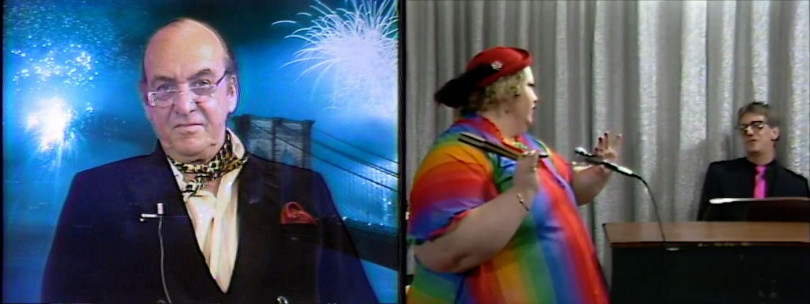During the rise of the LGBTQ+ rights movement in the 1970s and ’80s, visibility and community were crucial, and some leaders took to radio and television to elevate their voices and showcase culture. This spring semester, Pratt Institute School of Information students in Projects in Digital Archives digitized, catalogued, and curated online material from two of these programs: the Gay Morning America (GMA) public-access TV program (1984-85) and the Lesbian Nation radio program (1972-73). Recorded on now-obsolete media and fragile after being boxed away for decades, digitization prevented these programs from being lost forever.
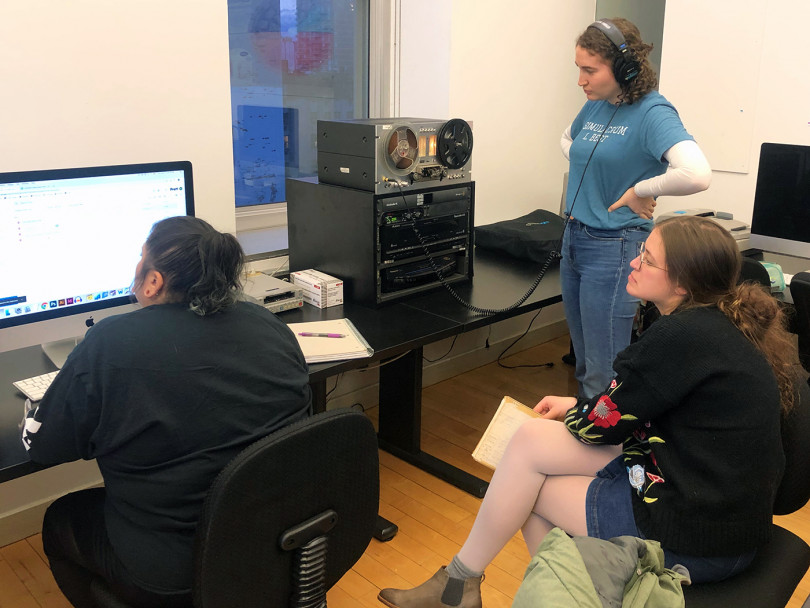
Vanessa Castaldo, MSLIS ’22, Simi Best, MSLIS ’22, and Emily Caspari, MSMDC ’20, listening to playback of the Lesbian Nation radio program during digitization (courtesy Anthony Cocciolo)
During the rise of the LGBTQ+ rights movement in the 1970s and ’80s, visibility and community were crucial, and some leaders took to radio and television to elevate their voices and showcase culture. This spring semester, Pratt Institute School of Information students in Projects in Digital Archives digitized, catalogued, and curated online material from two of these programs: the Gay Morning America (GMA) public-access TV program (1984-85) and the Lesbian Nation radio program (1972-73). Recorded on now-obsolete media and fragile after being boxed away for decades, digitization prevented these programs from being lost forever.
Anthony Cocciolo, dean of the School of Information who teaches Projects in Digital Archives, explained that he sees supporting grassroots archives as essential because “digitization projects such as these can be fairly costly.” Cocciolo has been leading his classes in digitization for the Lesbian Herstory Archives since 2010 and the LGBT Community Center National History Archive since 2019, recognizing that Pratt Manhattan’s home on 14th Street is just blocks from sites like the Stonewall Inn and the NYC AIDS Memorial, meaning that “in many ways, the LGBT civil rights movement is a local history story” to the Institute.
The Pratt student work on GMA was conducted in collaboration with the LGBT Community Center National History Archive. While the students were able to carry out digitization before the semester was disrupted by the pandemic, much of the descriptive, curatorial, and web work took place remotely. Episodes from GMA can now be viewed online on a site created for the Archive by Pratt students.
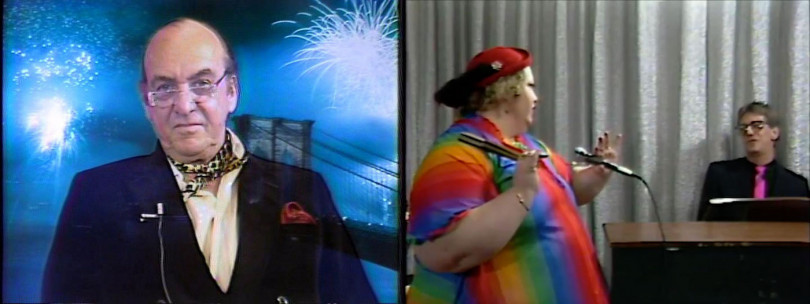
Screenshots from Gay Morning America: host George Sardi; musical performance by Sandy Doane and Jerry Scott (courtesy LGBT Community Center National History Archive)
Digitizing GMA was challenging as the program was recorded on now degraded U-matic videotape. “It was the first cassette-based analog video format used in professional contexts such as news programs,” Cocciolo said. “The playback machines are becoming far and few between, as are the experts who know how to repair them. We are on our second machine after the first broke down.”
Airing weekly from 1984 to 1985, GMA brought the gay culture of New York City—particularly Greenwich Village—to public-access television. Although its run was brief, it’s an important record of LGBTQ life in the city, especially as it aired at the beginning of the AIDS epidemic. The show was started, produced, and hosted by George Sardi and Johnny Savoy, who were regulars at many of the local spots that advertised on the show. (As part of the digitization project, these venues were mapped, showing how some have vanished during gentrification and others have survived.) Recurring segments included cocktail mixing with bartender Johnny Pool, fitness with Lord Byron Folk, theater reviews with Leslie Irons, sports with Johnny Fitzpatrick, lesbian issues with Lynn Lavner, musical performances, and recordings of special events like Ms. Fire Island 1985.
“The tapes offer snapshots of life in New York City at a time when being out was not as easy or accepted, and even more so, challenged by the ongoing AIDS crisis,” said Vanessa Castaldo, MSLIS ’22. “The historical value of these tapes range from notable local figures to the various resources advertised as supporting organizations for the local community. I felt that documenting them was very important and part of a larger picture of how the community functioned and sustained itself.”
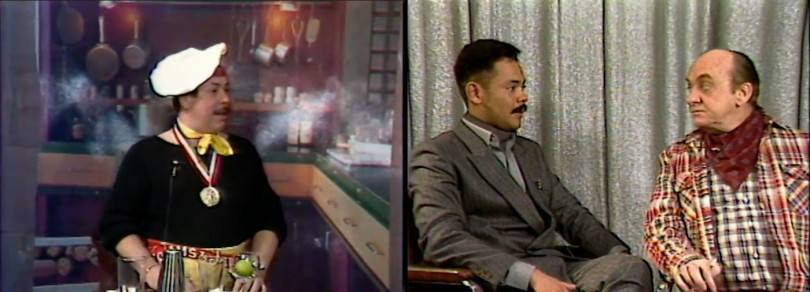
Screenshots from Gay Morning America: Johnny Pool demonstrating cocktail recipes; George Sardi interviewing fashion designer Gillman Sang (courtesy LGBT Community Center National History Archive)
GMA offered resources like discussion hotlines, directories for gay life, and, in later episodes, information on the evolving AIDS crisis. Those call-in shows included an October 26, 1985 episode with phone-ins on the Public Health Council’s vote on emergency regulations to slow the spread of AIDS and a November 23, 1985 episode featuring activist David Rothenberg talking about his recent city council campaign that raised awareness for the disease.
The students additionally worked on select broadcast audio tapes from the Lesbian Nation radio program in collaboration with the Lesbian Herstory Archives. Dating between 1972 and ’73 and produced by activist Martha Shelley, it was one of the earliest LGBTQ+ radios shows. Shelley was an advocate for LGBTQ+ and minority rights as a longtime member of the Daughters of Bilitis and as an early member of the Gay Liberation Front. On Lesbian Nation, she interviewed women on subjects ranging from activism and feminism to art a
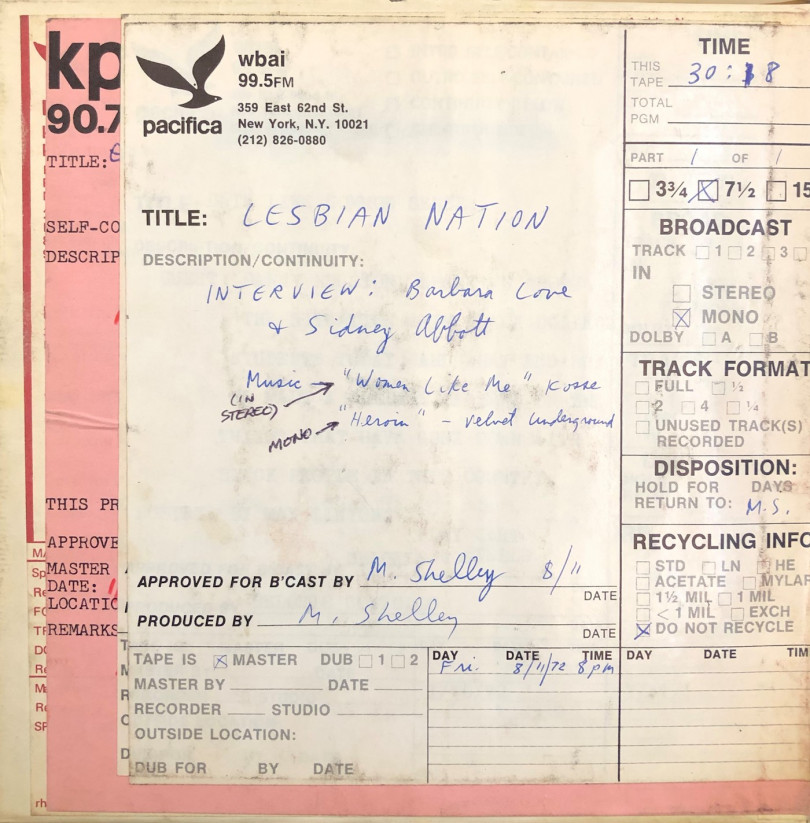
Lesbian Nation tape for an interview with Barbara Cove and Sidney Abbott (courtesy the Lesbian Herstory Archives)
As the program was recorded on open-reel tape that was spliced—meaning pieces of audio tape were held together by plastic adhesive, leading them to sometimes break during digitization—conservation was a delicate process.
“It definitely gave me a sense of the challenges of digitizing analog audiovisual materials, but also the urgency of doing so, because if we had waited another 10 or 20 years, these materials could have been in worse shape and we might have been able to digitize even less content,” said Laura Indick, MSLIS ’21.
TheLesbian Nation tapes site created by Pratt students for the Lesbian Herstory Archives has the digitized recordings as well as biographical information about the interviewees. Although the collection is only part of Lesbian Nation’s extensive broadcast series, the diversity of voices reflected in the digitized materials shows how vital the work is for an inclusive understanding of queer history.
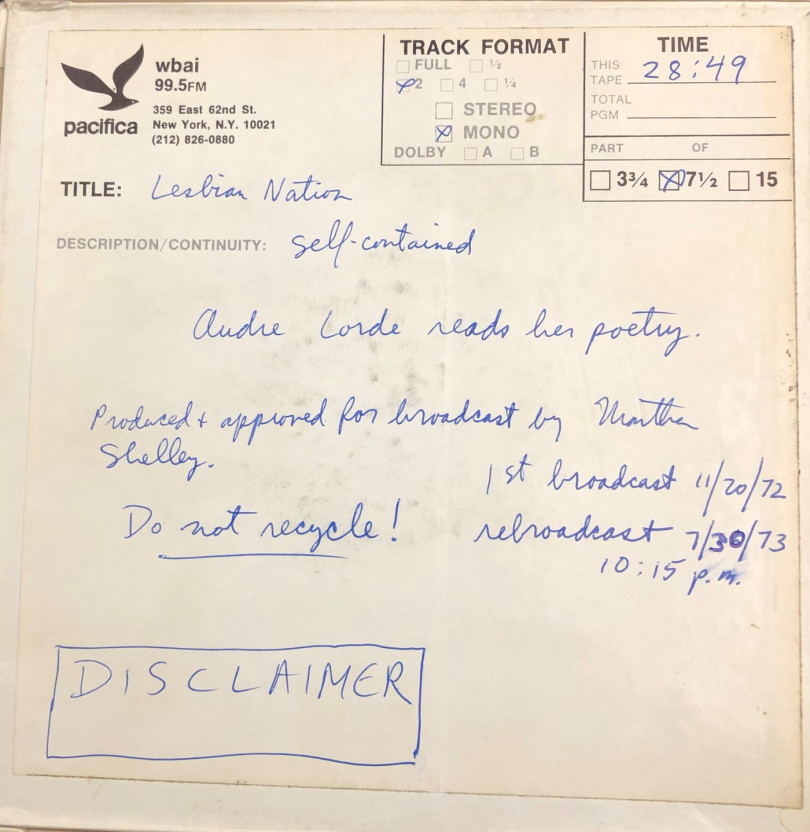
Lesbian Nation tape for Audre Lorde’s interview (courtesy the Lesbian Herstory Archives)
They include writer and civil rights activist Audre Lorde talking about her writing and reading selections of her poetry and competitive runner Judith Rawcliffe discussing her experiences in track and field. Cultural anthropologist Dr. Esther Newton addressed the importance of women working in science and technology and classical scholar Frances Doughty delved into her research on the Archaic Greek poet Sappho of Lesbos (it’s from her name that the word “lesbian” is derived).
“I think that it’s hard to overstate how valuable these collections are,” Indick said. “As a queer person myself, I am fascinated by the history of the LGBTQ+ community and it is so wonderful and important to be able to see and learn from our queer elders. And at a time when the Trump administration is attacking and erasing LGBTQ+ people in the United States, it is incredibly valuable for us to be able to have concrete proof that we lived and thrived a half-century ago.”
Before these projects, Gay Morning America and Lesbian Nation had a scarce digital footprint, as did many of the people who created and appeared on these programs. As Pratt students continue to digitize this history, their memory is strengthened and assures that their pioneering work in LGBTQ+ visibility will be preserved.
